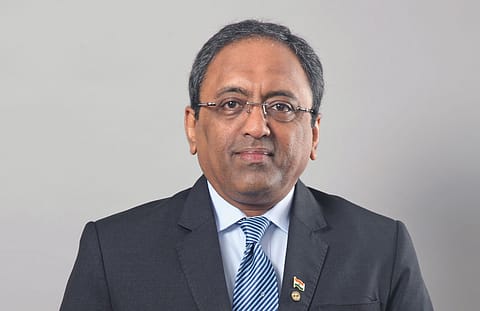'Labourers in India not willing to work': L&T's SN Subrahmanyan sparks fresh row over comments on workforce, employees
L&T Chairman SN Subrahmanyan links labour shortage to government welfare schemes and changing work culture, sparking fresh debate.

SN Subrahmanyan is part of a new row over his comments. After igniting controversy with his 90-hour work week remark, the Larsen & Toubro Chairman has once again found himself at the centre of a heated debate—this time over job migration, employees’ reluctance to return to office, and the impact of government welfare schemes on labour mobility.
Speaking at CII’s Mystic South Global Linkages Summit 2025 in Chennai on Tuesday, Subrahmanyan highlighted the growing resistance among tech employees to working from the office, stating that many would rather quit than comply.
“If you tell him [IT employee] to come to the office and work, he says bye. And that's a different world altogether," he remarked.
He also pointed out a shift in attitudes towards job relocation, contrasting the current scenario with his early career experiences.
“When I joined L&T in 1983, my boss said, if you are from Chennai, you go to Delhi and work. Today if I take a guy from Chennai and tell him to go to Delhi and work, he says bye,” he said.
Subrahmanyan also raised concerns about the construction industry facing a severe labour shortage due to workers’ reluctance to leave their hometowns. He attributed this trend to a preference for comfort and the availability of government welfare schemes such as MGNREGA, direct benefit transfers, and Jan Dhan accounts.
"Labour is not willing to move for opportunities. Maybe their local economy is doing well, maybe it is due to the various government schemes," he said, warning that this reluctance could impact India’s infrastructure development.
Recommended Stories
Subrahmanyan further pointed out that while L&T requires around 4 lakh workers, the company ends up recruiting 16 lakh people due to high attrition. He also stressed the need for wage revisions to match inflation, adding that many Indian workers migrate to the Middle East because of significantly higher salaries—three to 3.5 times what they earn in India.
Calling the evolving work culture a ‘funny world,’ he acknowledged that senior professionals were struggling to adapt to these changes.
“It is a funny world which we are trying to live in, and many of us wearing slightly more white hair are trying to understand it,” he said.
Emphasising the need for flexible workplace policies, he added, "We have to see how to live with this world and have policies which are flexible to understand all this and take it forward.”
(INR CR)
His latest remarks come weeks after his controversial advocacy for a 90-hour work week, where he suggested employees should even give up Sundays. His statement—"What do you do sitting at home? How long can you stare at your wife, and how long can the wife stare at the husband? Get to the office and start working. If I can make you work on Sundays, I will be happier because I work on Sundays"—triggered widespread backlash from business leaders, celebrities, and employees alike.
With his latest comments touching upon migration, labour policies, and workplace expectations, Subrahmanyan has once again reignited a larger conversation on India’s evolving professional landscape.